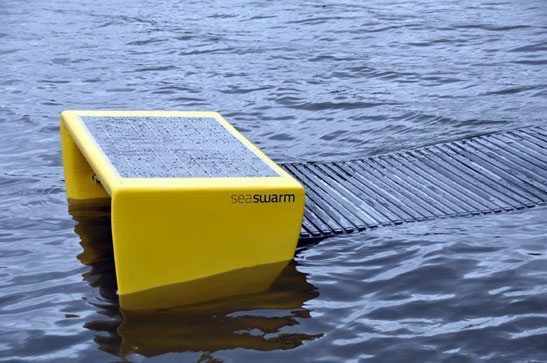Here’s the latest green news on oil absorbing robots, energy awareness month, eco-moms going strong, and others.
Fresh & Easy Opens First Store with CO2 Refrigeration
A recently-opened Fresh & Easy Neighborhood Market in Southern California is the first to use naturally-occurring carbon-dioxide refrigeration, and the first to be certified by the EPA’s GreenChill Partnership, an award granted to fewer than 40 of the nation’s 35,000 grocery stores. The natural refrigerant reduces the impact of the store’s refrigeration on the ozone layer by about 70 percent.
Fleet of Robots Designed to Clean Up Oil
Scientists at MIT have developed robots they call Seaswarm capable of cleaning oil spills through their super-absorbent “nanofabric.” They run on very little energy, solar-powered, and communicate with one another through global positioning systems and wireless communications. They’re small enough to reach hard-to-reach places and can clean for weeks at a time. This LA Times article features a Q&A with the director of MIT’s Senseable City Laboratory, who led the researchers on the project.
China Beat US in Offshore Wind, Europe Still Trounces Everyone Else in Solar Power
Two reports have come out recently demonstrating that the United States has some fierce competition in renewable energy. China has built the first major offshore wind farm outside of Europe despite Cape Wind’s progress. Europe itself was responsible for 80 percent of new solar PV systems installed last year, with Germany dominating that market.
Making Energy Awareness Month a Boon for Green Initiatives
A little-known fact: October is Energy Awareness Month. A complement to Earth Day in the spring, it’s the perfect opportunity to encourage employee activities and simple acts to conserve energy (the month’s other goal besides awareness).
Eco-Moms Represent $1.45T in Buying Power
A new category of moms has come into play: “EcoAware Moms.” Representing 69 percent of mothers and numbering 51 million, these moms see eco-friendly choices as the chance to teach important behaviors to their kids and to leave a legacy for future generations. They’re also more likely to believe they have control over how healthy their home is.
Photo Credit: A project by the MIT Senseable City Lab senseable.mit.edu/seaswarm
Photos by Kris Krüg and Andrea Frank
Graphics by Adam Pruden www.adampruden.com




